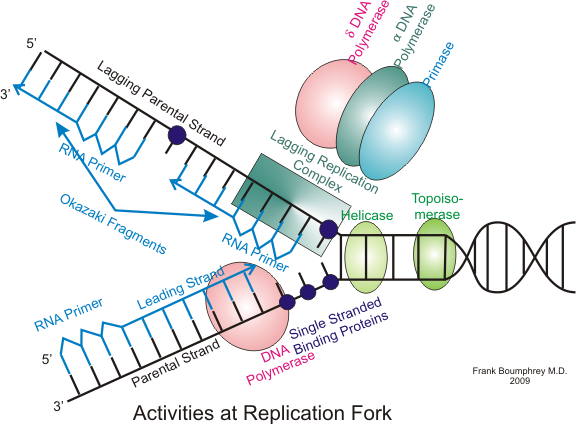Eukaryotic DNA replication is a complex and highly regulated process that occurs in the cell nucleus. It is essential for the maintenance of genomic integrity and the proper segregation of chromosomes during cell division. The molecular basis of eukaryotic DNA replication can be broken down into several key steps and components:
- Initiation: The first step in eukaryotic DNA replication is the formation of a replication fork, which is created by the binding of the replication initiator protein, origin recognition complex (ORC), to specific DNA sequences called origins of replication.
- Priming: After the replication fork is formed, a short RNA primer is synthesized by the primase enzyme at the leading strand and the lagging strand. The primer acts as a starting point for the synthesis of the new DNA strand.
- Elongation: The synthesis of the new DNA strands is carried out by the DNA polymerase enzyme. The leading strand is synthesized continuously, while the lagging strand is synthesized in short fragments called Okazaki fragments.
- Okazaki fragment processing: The Okazaki fragments are then joined together by the action of the DNA ligase enzyme, which seals the nicks between the fragments.
- Termination: The replication process is terminated when the replication machinery reaches the end of the chromosome.
- Checkpoint and repair: During replication, the integrity of the DNA is constantly monitored by a series of checkpoint proteins. If DNA damage is detected, the replication process is halted and the damage is repaired before replication can continue.
- Coordination with cell cycle: The replication of eukaryotic DNA is coordinated with the cell cycle, with replication occurring during the S-phase.
The molecular machinery responsible for DNA replication in eukaryotes include helicases, primases, DNA polymerases, single-strand binding proteins, sliding clamp, primosome, and replisome. The replication process is regulated by a number of different proteins and regulatory pathways that ensure the accurate and efficient replication of the genome.
Overall, eukaryotic DNA replication is a complex and tightly regulated process that is essential for the maintenance of genomic integrity and the proper segregation of chromosomes during cell division. Understanding the molecular basis of DNA replication is crucial for understanding the mechanisms that underlie cell growth and division, as well as the development and progression of diseases such as cancer.
